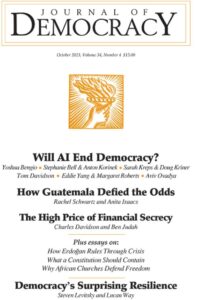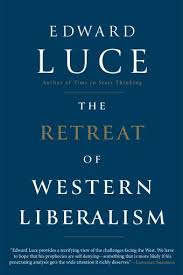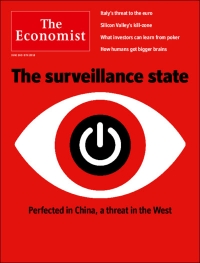 The days when democracy was considered the only viable political regime are over, according to a leading analyst.
The days when democracy was considered the only viable political regime are over, according to a leading analyst.
“This process of a declining Liberal West, along with its increasing inability and unwillingness to promote democracy, presents a significant challenge in the world,” says Dr. Steven R. Levitsky, the David Rockefeller Professor of Latin American Studies and Professor of Government at Harvard University. “Unfortunately, I don’t believe we can return to the world of 1990 to 2003 when democracy was, in many respects, almost the only game in town. Those days are over, and we now face a much more complex and challenging world.”
In an exclusive interview with the European Center for Populism Studies (ECPS), Professor Levitsky analyzed the state of liberal democracy worldwide, saying, “Unfortunately, I don’t believe we can return to the world of 1990 to 2003 when democracy was, in many respects, almost the only game in town. Those days are over, and we now face a much more complex and challenging world.”
Discussing the article jointly written with Professor Lucan A. Way for the October issue of the National Endowment for Democracy‘s Journal of Democracy, titled “Democracy’s Surprising Resilience,” where they emphasize that authoritarianism has a hard time consolidating power in countries with weak states, Levitsky argues that democracy promoters exaggerate democratic backsliding and criticizes those scholars for doing so because they want to highlight the degree of autocratization in the world.
 “Unfortunately, but inevitably, the Western dominance of the initial third wave period—the extraordinary liberal Western hegemony from the fall of the Berlin Wall or perhaps even the era of Perestroika to the Iraq War, spanning the first decade of the 21st century—that era, the extraordinary liberty of 1989 to 2003 is gone, it is eroding, and will continue to erode,” Levitsky adds.
“Unfortunately, but inevitably, the Western dominance of the initial third wave period—the extraordinary liberal Western hegemony from the fall of the Berlin Wall or perhaps even the era of Perestroika to the Iraq War, spanning the first decade of the 21st century—that era, the extraordinary liberty of 1989 to 2003 is gone, it is eroding, and will continue to erode,” Levitsky adds.
“I’m concerned that there has been an almost a rush to declare the world in a democratic recession, with an excessive focus on cases of backsliding, which are undoubtedly real. But they’re not the only thing happening in the world… Our assessment indicates modest backsliding over the last 15 years, rather than dramatic backsliding,” said Levitsky.
Technological shifts also threaten to undermine democratic norms and institutions, analysts suggest.
The rapid increase in network  of physical spaces, alongside traditional digital surveillance, has become a growing concern, notes Beth Kerley from the National Endowment for Democracy’s International Forum.
of physical spaces, alongside traditional digital surveillance, has become a growing concern, notes Beth Kerley from the National Endowment for Democracy’s International Forum.
It exposes individuals to potential targeting by both public and private entities. By 2021, it was predicted that the number of surveillance cameras globally would exceed 1 billion, blurring the lines between public and private surveillance, she told a panel – Beneath the Shadows: Private Surveillance in Public Spaces – at the Internet Governance Forum 2023.







